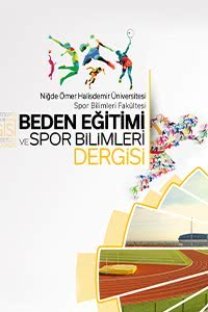Spor yapan ve yapmayan ilköğretim öğrencilerinin depresyon durumlarının bazı değişkenlere göre incelenmesi
Analysing the depression states of elementary school students who do sports or not according to some variables
___
- 1.Abele, A. Brehm. W., Moods and effeçts of exercise versus sports games: Findings and implications for well-being and health, Intern Review of Health Psychology.2,53-80, 1983
- 2.Akandere, M., Spor Yapan ve Yapmayan Öğrencilerin Depresyon Düzeylerinin İncelenmesi., Spor ve Tıp Dergisi, Sendrom 4,2,1, İstanbul, 2003
- 3.Antonelli,F., Sport and depression therapy, İnternational Journal of Sport Psychology.13,pp. 187-193, 1982
- 4.Artal M., Exercise Agaist Depression, The Physician Sportmedicine, 26-10, 1988
- 5.Aydın, G. .Üniversite Öğrencilerinde Depresyon Açıklama Biçimi ve Akademik Başarı İlişkisi, Psikoloji Dergisi. 22, s.6, 13, 1988.
- 6.Ayverdi, M., Erken Ergenlik Dönemi Ergenlerinin Depresyon Düzeylerini Etkileyen Bazı Dış Etmenler. (Yayınlanmamış Yüksek Lisans Tezi). Ankara: Hacettepe Üniversitesi, 1990.
- 7.Beck, A. T., Y.A. Rush, F.B. Show ve G.Emery., Conitive Therapy of Depression. Newyork, Guilford Pres, 1979
- 8.Brendt, D.J. ve Brendt, S.M., Relationship of Mild Depression to Psychological Deficit in College Students. Journal of Clinical Psychology. 96:1, PP. 868-874, 1980
- 9.Brown,J.D.,Siegel,J.M.,Exercise as a buffer of life stres: A multimodel comparision of aerobic fitness. Psychophysiogoly.24,173-180, 1988
- 10.Camacho,T.C.,Roberts,R.E.,Lazarus,N.B., Physical activity and depression:Evidence from the Alermeda country study, Amer .Jour.Epidem.134, 220-231, 1991
- 11.Caspersen, C.J., Powel,K.E. Christenson, G.M., Physical activity, exercise and physical fitness:Def, initions and districtions for healh-related research.Public Health Reports. 100,126-131,1985
- 12.Cohen, P.J., Kasen, S., Velez, C.N.,An Epidemiological Study Of Disorder In Late Childhood And Adolescence- I Age And Gender Specifie Prevalence. Journal of Child Psychology and Psychiarty. 34/6 pp:854-867, 1993.
- 13.Corbin, C.B., Lindsey, R.,. Conceps of Physical Fitness.(5th.Ed) Dubuque lowa: Wim C. Brown,1988
- 14.Çuhadaroğlu, F., Adölesanlarda Depresyon ve Anksiyetenin Birlikte Görülmesi: Bir Araştırma. Turk Psikiyatri Dergisi. 4:(3), s.189-
- 15.Dowall, JR, Bolter CP,Flett,RA, Kammann,R. Psychological well-being and its Relationship to fitness and Avtıvıty Levels. J Hum. Movement Stud 1439-45,1988
- 16.Friedrich;R.J., Depression and Suicidal Ideotion in Early Adolescencets. Journal of Youth and Adolescence, 11, pp.403-407. 1988.
- 17.Gjerde, B. ,Addescent Antecedents of Depressive Symtomotology at Age 18 , Psychologicol Bulletin. 1988.
- 18.Gökçakan, N.,Çeşitli Derecelerdeki Depresyonun Giderilmesinde Beck’in Bilişsel Terapisinin Etkinliğinin İncelenmesi. (Yayınlanmamış Doktora Tezi). Trabzon: Karadeniz Teknik Üniversitesi, 1997.
- 19.ISSP., Physical activity and psyc hological benefits: A Position Statement İnternational Journal of Sports Medicine.25, pp.135-139. 1992
- 20.Jhonsgard, K. ,The Motivation of the long distance runner: I.Journal of Sports Medicine.25,pp.135-139, 1985
- 21.Kandel, D. B. Davıs M. A., Seguale of Adalescent Depressiue Symptoms” Archives of General Psychiatry. 43, 255-262, 1986
- 22.Kashani, J.H., Carlos, G.A., Bexk, N.C., Depresion, Depressive Symptoms and Depressed Mood Among a Community Sample of Adolescents.Am. J.Psychiatry. 26;541-545, 1987.
- 23.Koruç, Z. Sporda Stresle Başa Çıkma ve Bilişsel Yaklaşımlar. Spor Psikolojisi Kursu.Ankara Üniversitesi Yayınları .s.119-132, Ankara, 1997
- 24.Keten M.Türkiye’de Spor,Ayyıldız matbaası, Ankara,1974
- 25.Koruç, Z. Bayar,P. , Egzersizin Depresyon Tedavisindeki Yeri ve Etkileri.Spor BilimleriDergisi, 15 (1),s. 50-61,2004
- 26.Kovacs M.,THe Children's Depsession Inventory (CDI).Psychopharmacol Bulletin ; 21: 995-998.15(1) s.50, 1985
- 27.Malatya Milli Eğitim Müdürlüğü İstatistik Bölümü(2010)
- 28.Marcotte, D., Irrational Beliefs and Depression Adolescense, Adolescense 31 (124), p.935-954,1996
- 29.Morgan, W.P., Affective beneficence of vigorous physical activity. Medicine Science in Sports Exercise.17(1), pp.94-101,1985
- 30.Morgan, P.M., Roberts,J.A. Feinerman, A.D., Psychological effect of acute physical activity. Archives of Physical Medicine Rehabiliation. 52,422-425,1971
- 31.Öztürk, O,.Ruh Sağlığı ve Hastalıkları, Nural Matbaacılık s.206,1988
- 32.Öy,B., Çocuklar için depresyon ölçeği: Geçerlilik ve güvenirlik çalışması. Türk Psikiyatri Dergisi ; 2:132-136,1991
- 33.Pelitbaş, A.J.,Managing stres on and of the field:The Litlefood approach to learned resourcefulness. In M. Anderson, Doing Sport Psychology.Illinois:human Kinetics Books.33-34,2000
- 34.Pollatschek, J.L. O’hagan.F.J., An investigation of the psycho-physical influences of a quality daily physical education programme. Health Education Research:Theory and Practice.4,341-350,1989
- 35.Sexton,H.,Meare, A. ve Dahl,N.H., Exercise intensity and reduction in neurotic symtoms: A controlled followup study. Acta Psychiatr Scand. 80 (9) 231-235,1989
- 36.Schoenbach, V. J. Kaplan, B. H. Grınson, R. C., Use of A Symptom Scale To Study The Prevalence of Depressive Syndrome in Young Adolescents, American Journal of Epidemiology, 1 1 6 :pp. 791-800,1982
- 37.Weinstein,W.S.,Meyers,A.W.,Running as a treatment of depression:is it worth it? Journal of Sport Psychology 5.pp.288-301,1983
- 38.Wolfgang,H., Spor Hekimliği.(Çev.M.İ.Arman),:Arkadaş Tıp Kitapları, Kırklareli, 1985
- 39.Yavuzer, H. , Ana-Baba ve Çocuk. İstanbul : Remzi Kitabevi,1998
- 40.Yavuzer, H. Çocuk Psikolojisi. İstanbul: Remzi Kitabevi, 15.Basım,1998
- 41.Yiğit , R, “İlköğretim II. Kademe Öğrencilerinin Depresyon ve Sosyal Beceri Düzeylerinin Benlik Saygısı ve Bazı Değişkenler Açısından Karşılaştırmalı Olarak İncelenmesi” Doktora Tezi, Selçuk Üniversitesi, s.79,80,81,82,83,Konya,2008
- 42.Tamer K.Beden Eğitimi ve Oyun Öğretimi, Ankara Üniversitesi yayınları, Açık Öğretim Fakültesi Yayınları,1998
- 43.Tiryaki, Ş.,Sportif Performans ile Edwars Kişisel Tercih Envanteri Verilerinin İlişkisi, Spor Bilimleri Dergisi,2(2) s.32-37, 1991
- 44.Zeis,A.M.,,Lewinsohn,P.M. Munoz,R,F., Nonspecific improvement effects in depression using interpersonal skills training, pleasant activity schedules or cognitive training,. Journal of Consulting, Clinical Psychology. 47(3), pp.427-439,1979
- ISSN: 1307-6477
- Yayın Aralığı: Yılda 3 Sayı
- Başlangıç: 2007
- Yayıncı: Niğde Üniversitesi Beden Eğitimi ve Spor Yüksek Okulu
Beden eğitimi öğretmen adaylarının epistemolojik inançları ve benlik saygıları arasındaki ilişki
Murat ÖZŞAKER, Meliha CANPOLAT, LALE YILDIZ ÇAKIR
The health-exercise/physical activity levels of the ice hockey players and coaches
Semiyha TUNCEL DOLAŞIR, Fehmi TUNCEL
CENGİZ ARSLAN, Mehmet GÜLLÜ, Varol TUTAL
Çocuklar için sporda hayal etme ölçeğinin Türkçeye uyarlanması: Bir geçerlik ve güvenirlik çalışması
Dağcılık sporuyla uğraşan bireylerin bu spora yönelme nedenleri üzerine bir araştırma
SÜMMANİ EKİCİ, Tekin ÇOLKOĞLU, Akan BAYRAKTAR
HÜSEYİN KIRIMOĞLU, YUNUS YILDIRIM, Ali TEMİZ
Negatif duygusallığın stres üzerindeki etkisi: Faal futbol hakemleri üzerinde bir araştırma
Yusuf CAN, ÜLKÜ ÇOBAN, FİKRET SOYER
Spor merkezlerinde tüketici tatmini ve sadakat
Ekstrem ve geleneksel spor katılımcıları arasında duygu arama farklılıklarının karşılaştırılması
